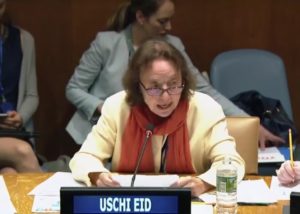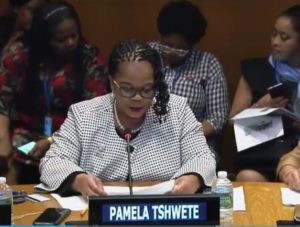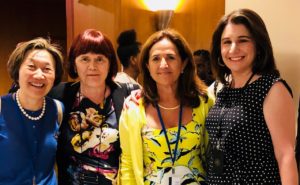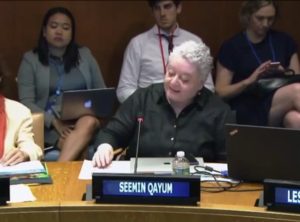Speakers:
 Presentation by Ms. Uschi Eid, former chairperson of the UN Secretary-Generals’ Advisory Board on Water and Sanitation (UNSGAB).
Presentation by Ms. Uschi Eid, former chairperson of the UN Secretary-Generals’ Advisory Board on Water and Sanitation (UNSGAB).
Ms. Eid began by saying it was clear that those in the room needed no education on the history of international decisions on water, sanitation and women, however, she summarised the historical cornerstones, to ensure the audience understood the general frustration felt and patience, beginning with the 1992 International Conference on Water and the Environment and The Dublin Statement on Water and Sustainable Development, adopted January 31, 1992 in Dublin, Ireland, some twenty-six years ago, where it was acknowledged that women must play a central role in the provision, management, and safeguarding of water, reflecting that our predecessors were smart enough to not reduce the gender issue to that of water supply, and the burden of fetching water. Ms. Eid mentioned international meetings and decisions on gender issues such as the OECD-Principles on Water Governance, and the International Decade ‘Water is life’. Recognising The World Water report “Water and Jobs” in 2016 for giving good insight into the absence of women as actors in the management of water resources and water infrastructure.
Ms. Eid views the SDGs as a good opportunity for all actors to facilitate women’s participation, empowerment and leadership. She said that many still don’t see that we are in a water crisis and that recommendations, which are on the table, are often not taken seriously. She underlined the importance of changing the narrative and extending dimensions, not just seeing women as beneficiaries or victims within the water dialogue – SDGs 6 and 5 can show us the way. She spoke of the integrated and nexus character of water and women: providing access to sanitation and hygiene decreases childbirth mortality; access to water decreases the distance women and girls need to travel, and as such, their vulnerability to violence; toilets in schools; increase girls’ attendance and participation in education – all of this and more shows that gender equality is not only a prerequisite to the success of the Sustainable Development Agenda but that investing in gender equality can deliver high returns.
 South Africa: H.E. Ms. Pamela Tshwete, Deputy Minister for Water and Sanitation.
South Africa: H.E. Ms. Pamela Tshwete, Deputy Minister for Water and Sanitation.
H.E. Tshwete spoke of the Republic of South Africa’s commitment to water and said the message was one of ‘leaving no one behind’. Historically women hold the responsibility for the household, however, they are left out of conversations relating to SDG 5 and SDG 6. She said that there must be a participatory approach and that men and women must have an equal voice, managing resources and sharing benefits. Women must be considered and acknowledged, they must have economic access, opportunities for leadership and employment and the chance to be innovators of solutions; empowerment is essential to poverty eradication and environmental regeneration. H.E. Tshwete urged that we should listen with critical minds, and work together as members states and organizations to support the UN International Year of Women and Water. This would serve as a vehicle to mobilise global political will, culminating in sustainable empowerment and opportunities in the water sector.
 Australia: Ms. Mina Guli, water advocate, and ultra-runner, committed to running 100 marathons in 100 days for water. She spoke of her water-stressed country and experience of growing up in drought. She spoke of herself as a child – the girl at the back of the room who wouldn’t put her hand up, and her message to future generations: “you do not have to be anyone in order to be someone”. Ms. Guli reflected on the role of water, not just as a driver of our daily habits but a driver for our futures and as a means of making a living. Seeing water as a source of opportunity and an enabler of dreams.
Australia: Ms. Mina Guli, water advocate, and ultra-runner, committed to running 100 marathons in 100 days for water. She spoke of her water-stressed country and experience of growing up in drought. She spoke of herself as a child – the girl at the back of the room who wouldn’t put her hand up, and her message to future generations: “you do not have to be anyone in order to be someone”. Ms. Guli reflected on the role of water, not just as a driver of our daily habits but a driver for our futures and as a means of making a living. Seeing water as a source of opportunity and an enabler of dreams.
Ms. Guli spoke of her focus on the global water crisis, the importance of women as leaders and change-makers, and the leadership and commitment shown by the Australian Government. Ms.Guli spoke of women as heroes, and of meeting ‘water heroes’ on her path. One hero, she met by the banks of the Murray – Darling is a 3rd generation farmer running her business, trading water rights, innovating and creating products to increase efficiency – leading in the business space. She also told a story of a woman painting a picture of a Billabong who said: “water is my life, everything I have and everything I will be”.
 Germany: Mr. Thomas Stratenwerth, Head of Unit for General, International and European Aspects of Water Management and Germany Water Director.
Germany: Mr. Thomas Stratenwerth, Head of Unit for General, International and European Aspects of Water Management and Germany Water Director.
Mr. Stratenwerth began by stressing the need to shift the focus from providing water and sanitation to women, to finding answers to how to strengthen the role of women in decision-making, management and also the implementation of SDG 6 and other water-related targets. He explained that in Germany there is more and more dependence on women in the workforce, due in part to demographics, and additionally due to competition from other sectors – a need to find skilled, engaged young people for water management purposes, particularly in decision-making. Mr. Stratenwerth highlighted how Germany is supporting the implementation of SDG 5 and SDG 6, by promoting equal access to water and sanitation for women and girls, improving sanitation for girls in schools and strengthening women’s participation in water resources management.
 Netherlands: Mr. Niels Vlaanderen, Coordinator for International Water Affairs, Ministry Infrastructure and Water management.
Netherlands: Mr. Niels Vlaanderen, Coordinator for International Water Affairs, Ministry Infrastructure and Water management.
 European External Action Service: Ms. Carmen Marques Ruiz, Policy Coordinator for Environment and Water in the Global unit for Global and Economic Issues.
European External Action Service: Ms. Carmen Marques Ruiz, Policy Coordinator for Environment and Water in the Global unit for Global and Economic Issues.
 Ms. Lesha Witmer, member of the Women for Water Partnership Steering Committee on the state of affairs of recent reports and tools.
Ms. Lesha Witmer, member of the Women for Water Partnership Steering Committee on the state of affairs of recent reports and tools.
Lesha Witmer began with her conclusions. The first being that women and water have something in common. Everyone agrees how important it is; how interlinked it is; and how cross-cutting it is. And yet, no one is acting on this. She discussed disaggregated data referencing a recent report by the UN Statistical Committee in December 2017, which had shortcomings.
 However, she noted a working group has now been set up to look deeper at this and work out how to disaggregate data and to implement 17.18, what member states have already signed up to do. This report will be ready for 2020, however, we need this analysis to make better decisions on policy; we need to speed up. On the reporting side Ms. Witmer said that some are doing a great job, however, the ongoing requests for the reports to be shortened impacts on the amount of data subsequently shown. Speaking of the SDG Report 2018, she ventured that figures showing increases in rural areas for the participation of women in water management, and not in cities, might be a warning for future trends – seeing this as a point of attention. Ms. Witmer finished by promising a report will be available on this meeting and the analysis of Voluntary Reviews received and thanked Linda Witong of Soroptimist International and Susan O’Malley of NGO/CSW NY and her team for their work on this.
However, she noted a working group has now been set up to look deeper at this and work out how to disaggregate data and to implement 17.18, what member states have already signed up to do. This report will be ready for 2020, however, we need this analysis to make better decisions on policy; we need to speed up. On the reporting side Ms. Witmer said that some are doing a great job, however, the ongoing requests for the reports to be shortened impacts on the amount of data subsequently shown. Speaking of the SDG Report 2018, she ventured that figures showing increases in rural areas for the participation of women in water management, and not in cities, might be a warning for future trends – seeing this as a point of attention. Ms. Witmer finished by promising a report will be available on this meeting and the analysis of Voluntary Reviews received and thanked Linda Witong of Soroptimist International and Susan O’Malley of NGO/CSW NY and her team for their work on this.
 Ms. Seemin Qayum, Sustainable Development Advisor, UN-Women – Moderator
Ms. Seemin Qayum, Sustainable Development Advisor, UN-Women – Moderator
Ms. Qayum began by referring to Turning promises into action: Gender equality in the 2030 Agenda for Sustainable Development, UN Women’s Flagship report, which provides a comprehensive and authoritative assessment of progress, gaps, and challenges in the implementation of the Sustainable Development Goals (SDGs) from a gender perspective. Monitoring global and regional trends in achieving the SDGs for women and girls based on available data, the report gives practical guidance for the implementation of gender-responsive policies and accountability processes. Ms. Qayum explained we have a history of dealing with these problems. From the Beijing Platform, we have to go beyond the burden on women and girls of the provisioning and management of water to actively take part as citizens with full rights.
 Closing: Ms. Mariet Verhoef-Cohen President of Soroptimist International and Women for Water Partnership
Closing: Ms. Mariet Verhoef-Cohen President of Soroptimist International and Women for Water Partnership
Ms. Verhoef-Cohen explained “You can’t manage what you can’t measure” and stressed the importance of Implementation. Summarising the main points of the session, she reflected on a statement by Uschi Eid that there is a lot of preaching about the inclusion of women in water, but there is still little practicing – stop doing things about them without them. There would be a recommendation to the HLPF to make policies concrete and convince the member states to make the means available. Most countries explained that they work on the implementation of SDG 6, but do not automatically include the role of women. This may show a lack of information, awareness, or prejudice regarding the important link between SDG 6 and SDG 5 and for this reason, she said they would recommend to the HLPF to facilitate further research and campaigning about this linkage, in the frame of an International Year on Water and Women, urging others to support this. A special year would emphasise the positive role of women in the success of water projects, in innovation and more efficient use of resources. It would give a boost to the inclusion of women in the water world.
Ms. Verhoef-Cohen went on to say that countries continue to suffer from a lack of data to measure SDG 6 and more specifically, sex-disaggregated data, so it remains difficult to know where we are. She said that Ms. Witmer made it clear that there are tools tested and made available by UNESCO/WWAP (World Water Assessment Programme) and they would be recommending the use of these.
In the report of the Secretary-General, it stated that gender inequality continues to hold women back and deprive them of basic rights and opportunities. Empowering women requires addressing structural issues such as unfair social norms and attitudes, lack of access to vocational training and paid jobs as well as developing progressive legal frameworks and practices that enhance equality between women and men. Or in other words, a call to put policy into practice. And we need UN Women and member states to help us.
Concluding, she said, with or without an international UN year, means of implementation are always necessary to include women on an equal basis in the water sector. The NGO/CSW publication about a gendered approach to the HLPF proposed to start a global fund for SDG 5 and SDG 6 based on the positive experiences of other global funds. We applaud this idea and call upon the Member States to recommend a special fund for Water and Women.

